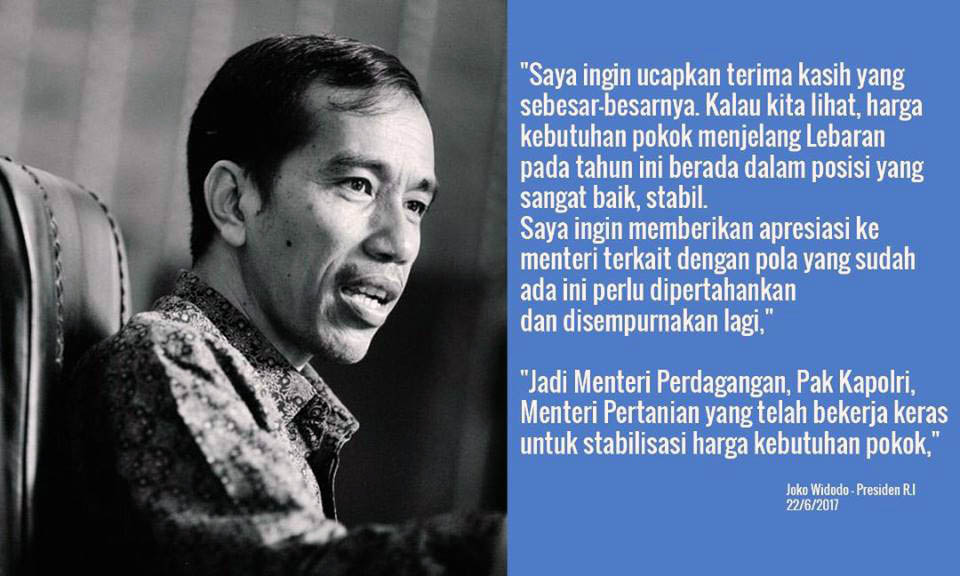Capaian Positif Tiga Tahun Sektor Pertanian di Era NawaCita
Indonesian Agricultural Development Hailed by President Joko Widodo
Reporter : Gusmiati Waris
Editor : Cahyani Harzi
Translator : Dhelia Gani

Jakarta (B2B) - Kementerian Pertanian RI menegaskan program kebijakan pembangunan pertanian di era pemerintahan Joko Widodo menunjukkan kinerja positif, produksi gabah kering giling (GKG) pada 2015 mencapai 75,55 juta ton atau naik 4,66% dari 2014 (70, 85 juta ton) dan padsa 2016 mencapai 79,1 juta ton, dan swasembada beras tercapai tahun ini setelah penantian 32 tahun.
Sekretaris Jenderal Kementan, Hari Priono mengatakan bahwa peningkatan produksi juga terjadi pada komoditas bawang merah dengan total produksi 1,29 juta ton atau naik 5,74% dari 2015 yang mencapai 1,22 juta ton. Begitu pula dengan cabai, produksi 2016 mencapai 78.167 ton melampaui kebutuhan 54.346 ton. Untuk jagung, Badan Pusat Statistik (BPS) mencatat produksi hingga Februasi 2017 sebesar 6,3 juta ton dibanding hasil 3,2 juta pada periode yang sama 2016 sehingga realisasi target produksi 24,2 juta ton pada 2017 akan tercapai.
"Kebijakan pemerintah di bidang pertanian memberikan dampak signifikan pada peningkatan produksi pangan strategis, dan kesejahteraan petani. Padi, jagung dan kedelai adalah tiga komoditas awal yang digenjot sejak awal melalui program Upsus Pajale," kata Hari Priono melalui pernyataan tertulis pada Selasa (11/7).
Dari capaian-capaian tersebut, Kementan mampu memenuhi ekspektasi target swasembada hanya dalam dua tahun. Pemerintah pun menempuh kebijakan yang berpihak kepada petani, dengan tidak mengeluarkan rekomendasi impor untuk beras, cabai dan bawang merah.
Capaian Positif
Menyikapi polemik impor beras pada 2016, Kementan menegaskan bahwa hal itu terkait dengan rekomendasi impor beras yang dikeluarkan pada 2015, namun sebagian realisasi impor dilakukan pada 2016 sehingga bukan rekomendasi dan importasi tuntas dilakukan pada tahun yang sama.
Kepala Biro Humas dan Informasi Publik, Agung Hendriadi memastikan bahwa pada 2016 dan hingga Juni 2017, pemerintah tidak pernah mengeluarkan rekomendasi impor beras medium, karena produksi nasional meningkat dan mampu memenuhi kebutuhan masyarakat tanpa harus mengimpor beras.
"Rekomendasi impor hanya untuk beras dengan kebutuhan khusus, kerap disebut specialty rice untuk memasok kebutuhan hotel, restoran dan kesehatan," kata Agung.
Pencapaian peningkatan produksi juga diikuti dengan meningkatnya nilai tukar petani (NTP) pada 2016 sebesar 101,65 pada 2016, naik 0,06% dari NTP 2015. Sementara nilai tukar usaha petani (NTUP) di posisi tertinggi dalam tiga tahun terakhir, NTUP 2016 mencapai 109,86 atau naik 2,3% dari 2015.
Untuk mengatasi gejolak harga pangan, Polri bersama Kementerian Perdagangan, Kementerian Dalam Negeri, Komisi Pengawas Persaingan Usaha (KPPU) dan Badan Urusan Logistik (Bulog) membentuk Satgas Pangan, yang terbukti efektif bekerja di seluruh Indonesia untuk menjaga pasokan pangan dan gejolak harga selama puasa Ramadan dan Idul Fitri 2017.
Kinerja Satgas Pangan diapresiasi oleh Presiden RI Joko Widodo, yang berkorelasi dengan gejolak inflasi seperti diumumkan BPS bahwa inflasi per Juni 2017 hanya 0,69%, atau terendah selama Ramadan dan Lebaran dalam tiga tahun terakhir.
Kepala BPS Suhariyanto mengatakan pembentukan Satgas Pangan berdampak besar dan positif terhadap stabilitas harga bahan-bahan pokok di masyarakat, karena selama ini kenaikan harga berdampak besar pada gejolak inflasi.
Jakarta (B2B) - Indonesian Agriculture Ministry confirms agricultural development policy program of Joko Widodo administration relatively positive, dry grain production 75.55 million tons in 2015 or 4.66% increase from 2014 (70,85 million tons) and 2016 reaches 79,1 million tons, and rice self-sufficiency reached this year after 32 years of waiting.
Secretary general of the ministry Hari Priono said the shallots production also increased to 1.29 million tons, up 5.74 percent from 2015 of 1.22 million tons. Similarly, chili production in 2016 reached 78,167 tons exceeding the consumption requirement of 54,346 tons. For the corn, Indonesian Statistics Agency recorded production until February 2017 of 6.3 million tons compared to 3.2 million in the same period of 2016 so that the realization of production target of 24.2 million tons in 2017 will be achieved.
"Government policies in agriculture have a significant impact on improving strategic food production, and farmers' welfare. Rice, corn and soybeans are the three priority commodities through a special effort program," Mr Priono said in written statement on Tuesday (July 11).
From the realization of that production, the agriculture ministry fulfilled the expectation of rice self-sufficiency target in just two years. The government's policy is to pro-farmers not to issue import recommendations for rice, chili and onion.
Positive Outcomes
Related to the polemic of rice imports in 2016, the ministry confirmed that it is related to the recommendation of rice imports in 2015, but the realization of imports is done in 2016.
The ministry's spokesman Agung Hendriadi confirmed in 2016 to June 2017, the government never issued recommendations on the import of medium rice, because national production increased and able to meet the needs of the community without imported.
"The import recommendation is only for rice with special needs, often called specialty rice to supply hotel, restaurant and health needs," Mr Hendriadi said.
The increase in production is also in line with the 2016 farmer exchange rate (NTP) increase of 101.65 in 2016, up 0.06% from 2015. While the farmer's trade exchange rate (NTUP) is in the highest position in the last three years, for 2016 reached 109, 86 or up 2.3% from 2015.
To overcome the food price volatility, the Indonesian police with trade ministry, the interior ministry, the Business Competition Supervisory Commission (KPPU) and the Logistics Agency (Bulog) established food task unit called the Satgas Pangan across the country to safeguard food supply and price fluctuations during Ramadan and the Eid.
The performance of the task force was appreciated by President Joko Widodo, which had an impact on inflation as announced by the BPS that inflation per June 2017 was only 0.69%, or the lowest during Ramadan and Lebaran in the last three years.
Head of the BPS Suhariyanto said the formation of Food Satgas has a positive impact on the price of basic commodities in the community, as price increases have a strong impact on inflation.















